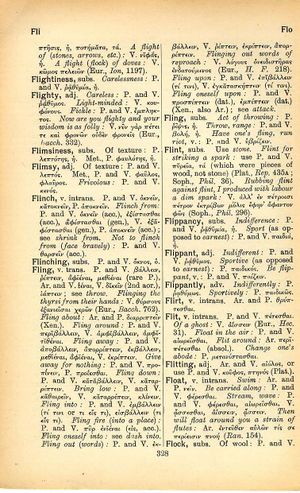flint: Difference between revisions
From LSJ
ἰσότης φιλότητα ἀπεργάζεται → equality leads to friendship
(CSV4) |
m (Woodhouse1 replacement) |
||
| Line 1: | Line 1: | ||
{{Woodhouse1 | {{Woodhouse1 | ||
|Text=[[File:woodhouse_328.jpg|thumb|link={{filepath:woodhouse_328.jpg}}]] | |Text=[[File:woodhouse_328.jpg|thumb|link={{filepath:woodhouse_328.jpg}}]] | ||
Use | ===substantive=== | ||
Use [[stone]]. | |||
[[flint for striking a spark]]: use [[prose|P.]] and [[verse|V.]] [[πυρεῖα]], τά (which were pieces of wood, not stone) ([[Plato]], ''[[Republic]]'' 435A; [[Sophocles|Soph.]], ''[[Philoctetes]]'' 36). | |||
[[rubbing flint against flint]], [[I produced with labour a dim spark]]: [[verse|V.]] [[ἀλλ' ἐν πέτροισι πέτρον ἐκτρίβων μόλις ἔφην' ἄφαντον φῶς]] ([[Sophocles|Soph.]], ''[[Philoctetes]]'' 296). | |||
}} | }} | ||
Revision as of 08:53, 20 May 2020
English > Greek (Woodhouse)
substantive
Use stone.
flint for striking a spark: use P. and V. πυρεῖα, τά (which were pieces of wood, not stone) (Plato, Republic 435A; Soph., Philoctetes 36).
rubbing flint against flint, I produced with labour a dim spark: V. ἀλλ' ἐν πέτροισι πέτρον ἐκτρίβων μόλις ἔφην' ἄφαντον φῶς (Soph., Philoctetes 296).

